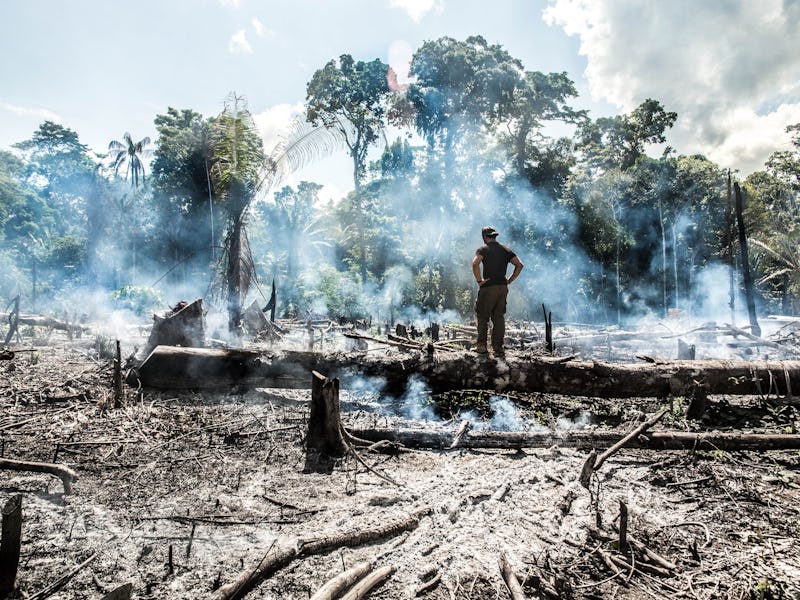Experts Explain How You Can Help Protect the Amazon From Destruction
"When the farthest room in your house is burning, your house is still on fire."

The Amazon rainforest is burning. These fires are spurred on by a combination of climate change-driven droughts and human activities, primarily slash-and-burn deforestation. On Monday, smoke from fires in the Amazon caused the skies of Sao Paulo, Brazil, to go black — an apocalyptic sight that ignited a social media movement.
As the Amazon experiences an 84-percent increase in fires compared to 2018, thousands have asked what they can do to stop the destruction. In Brazil, President Jair Bolsonaro has responded to global condemnation of the fires by saying he is considering sending in the army to put them out.
Meanwhile, there were protests against the government’s environmental policies across 40 cities on Friday — it’s Bolsonaro’s support of agricultural expansion in the Amazon and aggression towards Indigenous communities, critics say, that has allowed this situation to reach this point.
If you live outside of Brazil, you can’t attend these protests, but experts say there are steps you can take to protect the rainforest. Here are three examples outlined below:
Consider Your Vote
Paul Rosolie, co-founder and director of the non-governmental organization Junglekeepers, emphasized to Inverse that while it may feel stressful to see the destruction, and it can feel alienating to watch from afar, this is a global crisis. And that means that people need to pressure their own nation’s representatives to support conservation and demand change in Brazil.
“We really need this to be on the forefront of everyone’s thoughts during elections,” Rosolie says. “Right now Brazil has a president who is not interested in conservation.”
The leaders of other nations are currently putting the pressure on Bolsonaro, too, which demonstrates what can happen when environmentally-friendly leaders are elected into office. Ahead of Saturday’s G7 summit, France and Ireland’s heads of state have threatened to block a free-trade agreement between the European Union and South American countries, called the Mercosur. They’ve said if Bolsonaro does nothing to stop the Amazon’s deforestation, they’ll walk away from the deal.
“The fires in the Amazon are the result of complicated political, financial, and social factors,” Henriette Walz, Deforestation Lead for the Rainforest Alliance, explained in a statement emailed to Inverse. “We need continued collaborative effort from governments, companies, and consumers to send a message. We know the links between climate change, deforestation, and human welfare are there.”
And if an individual doesn’t view what’s happening in the Amazon as an event that affects the planet as a whole, Rosolie puts it this way: “Some people say ‘oh the Amazon is far away,’ but when the farthest room in your house is burning, your house is still on fire.”
Put on the Pressure With Purchasing Power
Robin Chazdon, Ph.D., is a professor at the University of Connecticut and an expert in tropical forest ecology. She explains that Brazil’s previous success in reducing deforestation proved that protecting and restoring the Amazon is possible. Chazdon says that there are numerous possible steps to get the forest back on track, including supporting organizations that work to protect indigenous rights and forests, as well as putting pressure on Brazil’s government politically and financially.
“One thing that people in other countries can do is pressure the Brazilian government to change their policies,” Chazdon tells Inverse. “We can boycott soy, beef, and timber from Amazon supply chains.”
A frog in the Amazon rainforest who was caught in the fire.
Rosolie concurs, pointing to a campaign that restricted palm oil products in an effort to protect Indonesian rainforests.
“Beef accounts for 60 percent of the deforestation in the Amazon,” Rosolie says. “People who want to help can change their consumer habits. Reducing meat consumption is good — if you’re a meat eater, having locally sourced, responsibly raised meat is a good compromise.”
The United States stopped importing fresh beef from Brazil in 2017 after issues with meat inspection on the Brazilian side. However, in March the United States began a process of reassessment and is considering reopening the beef market. Meanwhile, in 2018 Brazil exported an estimated 1.628 million metric tons of beef — the highest amount in its history. China and Hong Kong imported 44 percent of that haul.
Support Organizations Who Are Out There Doing the Work
A number of organizations are dedicated to fighting against rainforest deforestation and biodiversity destruction. For its part, Junglekeepers protects 30,000 acres within the Las Piedras region, an area that Rosolie describes as “a major artery of the Amazonian headwaters that runs straight into Brazil.” Additionally, Junglekeepers employs and trains local and Indigenous community members as forest rangers.
In response to the current fires, Rainforest Alliance has pledged to redirect 100 percent of its donated funds to frontline groups in the Brazilian Amazon, including the Brazil chapter of their Indigenous federation partner COICA and their sustainable agriculture partner IMAFLORA.
Junglekeepers' Rosolie moves through a fire.
Chazdon explains that restoration of the forests can’t replace the original life loss, “so forest conservation remains a major priority.” Simply allowing forests to regrow is a cost-effective solution — but it’s difficult to do that on recently burned land that was prepared for agricultural use.
“Forests can regrow and be restored by planting following fires, but not if fires are repeated every few years and not if the land is converted to agriculture,” Chazdon says. “This type of activity will turn forests into scrublands and will shrink the area of intact forest in the Amazon, exposing more intact forest to effects of logging, fragmentation, and agricultural conversion, all which increase vulnerability to burning in the future.”